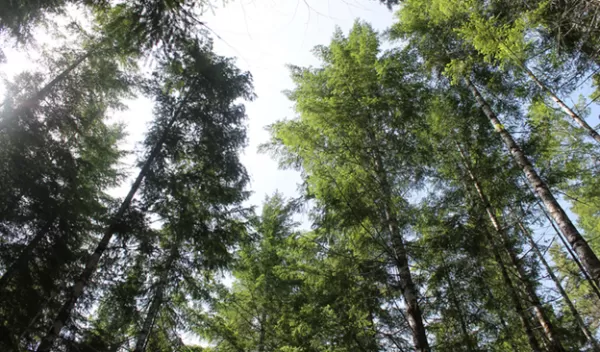
Forests' carbon uptake will be compromised by climate change, leaf temperature study suggests
Leaves in forest canopies are not able to cool themselves below the surrounding air temperature, likely meaning that trees' ability to avoid damaging temperature increases, and to pull carbon from the atmosphere, will be compromised in a warmer, drier climate.
The findings, by Oregon State University and other scientists, contrast with a prevailing theory that canopy leaves can keep their temperature within an optimal range for photosynthesis — the process through which green plants make their food from sunlight and carbon dioxide.
The U.S. National Science Foundation-supported research, published in Proceedings of the National Academy of Sciences, is important for understanding and predicting plant responses to climate change, said lead author Chris Still, who notes that multiple studies suggest many of the world's forests are approaching their thermal limit for carbon uptake.
"A hypothesis known as limited leaf homeothermy argues that through a combination of functional traits and physiological responses, leaves can keep their daytime temperature close to the best temperature for photosynthesis and below what is damaging for them," said Still. "Leaves should cool below air temperature at higher temperatures, typically greater than 25 or 30 degrees Celsius. That theory also implies that the impact of climate warming on forests will be partially mitigated by the leaves' cooling response."
Still and collaborators used thermal imaging to look at canopy-leaf temperature at numerous well-instrumented sites in North America and Central America — from Panamanian rain forest to the high-elevation tree line in Colorado — and found that canopy leaves do not consistently cool below daytime air temperatures or remain within a narrow temperature range as predicted by the limited leaf homeothermy theory.
"The results have big implications for understating how plants acclimate to warming, and they suggest a limited ability for canopy leaves to regulate their temperature," Still said. "Our data and analyses suggest a warming climate will result in even higher canopy leaf temperatures, likely leading to reduction of carbon assimilation capacity and eventually heat damage."
Research locations included the NSF-supported H.J. Andrews Long-Term Ecological Research site in Oregon.
